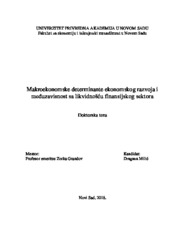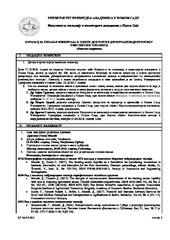Приказ основних података о дисертацији
Makroekonomske determinante ekonomskog razvoja i međuzavisnost sa likvidnošću finansijskog sektora
The Macroeconomic Determinants of Economic Development and Their Interdependence with the Financial Sector Liquidity
| dc.contributor.advisor | Grandov, Zorka | |
| dc.contributor.other | Carić, Marko | |
| dc.contributor.other | Soleša, Dragan | |
| dc.contributor.other | Grandov, Zorka | |
| dc.creator | Milić, Dragana | |
| dc.date.accessioned | 2018-12-26T13:24:00Z | |
| dc.date.available | 2018-12-26T13:24:00Z | |
| dc.date.available | 2020-07-03T18:19:52Z | |
| dc.date.issued | 2018-10-18 | |
| dc.identifier.uri | https://www.cris.uns.ac.rs/DownloadFileServlet/Disertacija153985634019322.pdf?controlNumber=(BISIS)108158&fileName=153985634019322.pdf&id=12191&source=NaRDuS&language=sr | sr |
| dc.identifier.uri | https://nardus.mpn.gov.rs/handle/123456789/10449 | |
| dc.identifier.uri | https://www.cris.uns.ac.rs/record.jsf?recordId=108158&source=NaRDuS&language=sr | sr |
| dc.identifier.uri | https://www.cris.uns.ac.rs/DownloadFileServlet/IzvestajKomisije153985634920968.pdf?controlNumber=(BISIS)108158&fileName=153985634920968.pdf&id=12192&source=NaRDuS&language=sr | sr |
| dc.description.abstract | Ekonomski razvoj podržan ljudskim resursima, stabilnom inflacijom, rastom privredne aktivnosti, područje je analize brojnih autora. Pokušaji praktičnog rešavanja problema nezaposlenosti i doskorašnjeg vrlo niskog bruto domaćeg proizvoda kao i održavanja stabilne inflacije, učinilo je tokove ekonomskog razvoja neohrabrujućim, najpre zbog teške društvene i ekonomske realnosti. Prisustvo ekonomskog razvoja vremenom stvara nove potrebe privrednih subjekata i stanovništva, što se odražava na bankarski sektor i na sektor osiguranja kao intermedijara i kao pružaoca adekvatne zaštite od rizika. Analiza teorijskog okvira makroekonomskih determinanti ekonomskog razvoja i likvidnosti finansijskog sektora od presudne je važnosti za razumevanje njihove međuzavisnosti. Kada je reč o bruto domaćem proizvodu, njegov rast utiče na porast aktivnosti jedne privrede, ali i na rast tražnje za bakarskim kreditima jer poslovni subjekti imaju želju da ostvare kvalitetne poslovne projekte. U ovakvom scenariju dolazi do smanjenja likvidnih sredstava banke. Likvidnost sektora osiguranja u Srbiji trpi sve promene u nivou razvijenosti privrede jer je direktno zavistan od životnog standarda stanovništva i mogućnosti investiranja slobodnih novčanih sredstava. Likvidnost banakrskog sektora je u korelaciji sa nivoom nezaposlenosti s obzirom na to da rast nezaposlenosti smanjuje sposobnost dužnika da izmiruje svoje obaveze prema banci, a poslovne banke navodi da smanjuju svoju kreditnu aktivnost kao i broj potencijalnih klijenata. Ovakav scenario formira povećanje likvidnih sredstava u banci, ali i udeo problematičnih kredita. Likvidnost sektora osiguranja takođe je u korelaciji sa nivoom nezaposlenosti, gde visoke stope nezaposlenosti i smanjene mogućnosti stanovištva da kupuju neke od proizvoda osiguranja, umanjuju tražnju za njima i opredeljuju pojedinca da svoje potrebe zadovoljava na znatno nižem nivou. U periodima sporog ekonomskog razvoja inflacija se često koristi kao instrument za postizanje određenih ciljeva, a naročito se misli na dostizanje višeg nivoa ekonomskog razvoja i ostvarenje rasta zaposlenosti. Visoke stope inflacije smanjuju kreditnu aktivnost banaka što posledično povećava likvidne rezerve banke. Međuzavisnost postoji jer rast potrošačkih cena deluje na smanjenu ukupnu tražnju koja opet usporava privrednu aktivnost i tražnju za kreditima. Dejstvo inflacije na likvidnost sektora osiguranja u Srbiji nije identifikovano. Na osnovu različitih teorijskih i empirijskih rezultata, kao predmet istraživanja doktorske disertacije postavlja se analiza međuzavisnosti odabranih makroekonomskih determinanti ekonomskog razvoja i likvidnosti finansijskog sektora. Uvažavajući navedeno, moguće je ukazati na makroekonomske determinante ekonomskog razvoja sa najvećom međuzavisnošću sa likvidnošću bankarskog sektora i sektora osiguranja. Kao cilj istraživanja doktorske disertacije postavlja se ocena da li i na koji način varijacije makroekonomskih determinanti ekonomskog razvoja utiču na izloženost finansijskog sektora riziku likvidnosti. U okviru definisanog predmeta istraživanja primenjene su metode istraživanja poput komparativne metode, deskriptivne statistike, korelacione analize, linearne logističke regresije, nad podacima makroekonomskih determinanti ekonomskog razvoja i likvidnosti bankarskog sektora i sektora osiguranja. Pružen je zaključak u kojem se navodi koji finansijski sektor tj. njegova likvidnost, ostvaruje veću međuzavisnost sa makroekonomskim indikatorima ekonomskog razvoja, čime je obogaćeno i upotpunjeno naučno saznanje | sr |
| dc.description.abstract | Economic development supported by human resources, stable inflation, growth of economic activity has been study issues of numerous authors. Attempts to practically solve the unemployment problem and the current very low gross domestic product, as well as to maintain stable inflation, have made the flow of economic development unsustainable, primarily due to the difficult social and economic reality. The presence of economic development over some time creates new needs of business entities and the population, which is reflected in the banking sector and the insurance sector as intermediaries and as providers of adequate risk protection. The analysis of the theoretical framework of macroeconomic determinants of economic development and liquidity of the financial sector is crucial for understanding their interdependence. When it comes to gross domestic product, its growth affects the increase in the economic activity but also the growth in demand for bank loans, as business entities have a desire to achieve quality business projects. In this scenario there is a decrease in the bank's liquid assets. The liquidity of the insurance sector in Serbia suffers from all changes in the level of economic development because it is directly dependent on the living standard of the population and the possibility of investing free cash. Liquidity of the banking sector is in correlation with the level of unemployment, since the growth of unemployment reduces the ability of the borrower to settle its obligations towards the bank, and commercial banks state that they reduce their lending activity and the number of potential clients. This scenario forms the increase of liquid assets in the bank, as well as the share of problem loans. Liquidity of the insurance sector also depends on the level of unemployment, where high unemployment rates and reduced ability to buy some of the insurance products reduce the demand for them and force an individual to satisfy their needs at a significantly lower level. In periods of slow economic development, inflation is often used as an instrument for achieving certain goals, and in particular it means to achieve a higher level of economic development and achieve employment growth. High inflation rates reduce the lending activity of banks, which consequently increases the bank's liquid reserves. Interdependence exists because the growth of consumer prices affects the reduced total demand, which again slows down economic activity and demand for loans. The effect of inflation on the liquidity of the insurance sector in Serbia has not been identified. Based on different theoretical and empirical results, the research issue of the doctoral thesis is the analysis of the interdependence of the selected macroeconomic determinants of economic development and liquidity of the financial sector. Taking into account the abovementioned, it is possible to point out to the macroeconomic determinants of economic development with the highest interdependence with the liquidity of the banking sector and the insurance sector. The goal of the research in this doctoral dissertation is to assess whether and how the variations of macroeconomic determinants of economic development influence the exposure of the financial sector to the liquidity risk. Within the defined research problem, research methods such as comparative method, descriptive statistics, correlation analysis, linear logistic regression, data on macroeconomic determinants of economic development and liquidity of the banking sector and the insurance sector were applied. A conclusion has been drawn that states which financial sector, i.e. its liquidity, achieves greater interdependence with macroeconomic indicators of economic development, which enriched and broadened scientific knowledge. | en |
| dc.language | sr (latin script) | |
| dc.publisher | Универзитет Привредна академија у Новом Саду, Факултет за економију и инжењерски менаџмент | sr |
| dc.rights | openAccess | en |
| dc.rights.uri | https://creativecommons.org/licenses/by-nc/4.0/ | |
| dc.source | Универзитет Привредна академија у Новом Саду | sr |
| dc.subject | Makroekonomske determinante | sr |
| dc.subject | Macroeconomic determinants | en |
| dc.subject | Ekonomski razvoj | sr |
| dc.subject | Likvidnost | sr |
| dc.subject | Međuzavisnost | sr |
| dc.subject | Bankarski sektor | sr |
| dc.subject | Sektor osiguranja | sr |
| dc.subject | Korelacija | sr |
| dc.subject | Linearna logistička regresija. | sr |
| dc.subject | Economic development | en |
| dc.subject | Liquidity | en |
| dc.subject | Interdependence | en |
| dc.subject | Banking sector | en |
| dc.subject | Insurance sector | en |
| dc.subject | Correlation | en |
| dc.subject | Linear logistic regression | en |
| dc.title | Makroekonomske determinante ekonomskog razvoja i međuzavisnost sa likvidnošću finansijskog sektora | sr |
| dc.title.alternative | The Macroeconomic Determinants of Economic Development and Their Interdependence with the Financial Sector Liquidity | en |
| dc.type | doctoralThesis | en |
| dc.rights.license | BY-NC | |
| dc.identifier.fulltext | http://nardus.mpn.gov.rs/bitstream/id/59246/IzvestajKomisije.pdf | |
| dc.identifier.fulltext | http://nardus.mpn.gov.rs/bitstream/id/59245/Disertacija.pdf | |
| dc.identifier.fulltext | https://nardus.mpn.gov.rs/bitstream/id/59246/IzvestajKomisije.pdf | |
| dc.identifier.fulltext | https://nardus.mpn.gov.rs/bitstream/id/59245/Disertacija.pdf | |
| dc.identifier.rcub | https://hdl.handle.net/21.15107/rcub_nardus_10449 |



